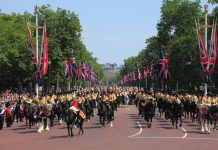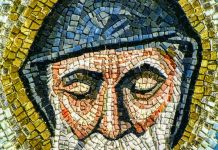William Shakespeare, Thomas Cromwell and Robert the Bruce all make historian Dan Snow’s top 10 of the greatest men in British history – who would make your list?
Historian and television presenter, Dan Snow shares his list of the top 10 most notable men in British history (in no particular order)…
1. Alfred the Great (849–99)
Alfred the Great is really the father of England. Before Alfred the idea that you could unify quarrelsome Saxon kingdoms and the Celtic kingdoms of the southwest and Britons of the northwest was a pipe dream. But he achieved that. To start with, he was a great military ruler: as King of Wessex he saw off the Vikings, who had threatened to carve up England. By inventing a system of fortified towns – a military innovation – he protected Wessex. The Vikings were tough and scary, but what they couldn’t do was besiege. They came by boat and couldn’t bring heavy equipment: put a wall in front of them and they were in trouble.
Alfred had a profound effect not just in terms of the military, but also on learning and education. He was far-sighted: it was he who started the codification of the English legal system. He was a founding father of the English project – he began to call himself King of the Angles and Saxons – and his descendants, particularly his grandson Athelstan, went on to conquer the whole of England. He was altogether a really extraordinary man who began the movement to a more integrated British Isles.
2. Robert the Bruce (1274–1329)
Robert the Bruce was someone who was as important in the history of Scotland as Alfred was in the history of England. He is one of the most important Britons ever – I’m often asked about top British people and no one mentions anyone who lived outside England. He was the first King of Scotland: he crowned himself at Scone – very symbolic as Edward I, King of England, had removed the Stone of Scone to form part of the Coronation Chair in Westminster Abbey.
It is thanks to Robert the Bruce, and virtually him alone, that there was no lasting conquest of Scotland. When Scotland and England did later join together to form Britain, it was as equal partners rather than one as a conquered nation. What most people know about him is the legend of the spider that is supposed to have inspired him when hiding in a cave, but the important thing is his massive impact on British history.
Robert the Bruce’s actions explain why there are two separate countries of England and Scotland – it was the result of Robert the Bruce’s seemingly hopeless opposition to King Edward I and Edward II. He was a great leader and a great warrior: he managed to put together a coalition and defeat a massive English army and establish an independent Scotland. Bannockburn was by far the most significant and far-reaching English defeat. After that, there was no serious attempt to annexe Scotland.
3. William Shakespeare (1564–1616)
William Shakespeare is absolutely a man of history, one of the most significant human beings that has ever lived. He is the finest writer of English and probably the greatest wordsmith in history. If you are going to talk about the English language – or even just language – you have to talk about Shakespeare: he means something to everyone. He has been translated all over the world. It’s almost ironic to put him in a list of Britons: he doesn’t really belong to any one place, I don’t think, though of course he was born and raised in England, in Stratford-upon-Avon. Shakespeare is for everyone. His history plays alone have coloured every succeeding generation’s view of the kings of England. Richard still languishes in ignominy while King Henry V is an unblemished hero.
4. Thomas Cromwell (1485-1540)
When he was chief minister to King Henry VIII, as touched upon in the BBC’s recent adaptation of Wolf Hall, Thomas Cromwell engineered the break with Rome. But he did more than advocate the Reformation – he started to define the rights and status of the English Parliament in England and the King’s relationship with Parliament: the idea that the highest law of the land is that which is voted for in Parliament and assented to by the King is one that remains to this day.
He was also a terrifically good organiser and a moderniser. It was he who instituted the registration of births, marriages and deaths in each parish, for example. He tried to break the power of the church, of aristocratic privileges; he sorted out the anomalies left over from medieval history, he brought in legislation to make things uniform, and to help the state to tax people effectively. He started to turn England into a modern power.
5. John Churchill, 1st Duke of Marlborough (1650-1722)
I wanted to include a general and decided that Marlborough was more significant than even the Duke of Wellington, who famously won the Battle of Waterloo, and Montgomery of Alamein, who helped turn round the Second World War. He was a particularly extraordinary general who won very significant battles against King Louis XIV of France, who at that time was the most powerful man in Europe.
Interestingly, he was also a diplomat and a politician – his wife was Queen Anne’s best friend – and he was a man who moved in the highest circles of governmental life, as well as the military. His diplomatic skills were fundamental to holding together the Grand Alliance, the coalition against Louis XIV. He lived to be a fine old man – he was 72 when he died. And, of course, he had a famous descendant – Sir Winston Churchill was born in the house that Marlborough built, at Blenheim Palace – named after one of his victories.
6. Joseph Banks (1743–1820)
Just as Shakespeare had an impact on global culture, I wanted to choose someone who had an impact on the birth and growth of science – and Joseph Banks had a huge effect both in his own work – he took part in one of the most significant scientific explorations with Captain Cook through the South pacific on Endeavour, bringing back hundreds of botanical specimens – but almost more importantly, as a hub for other scientists. He got Kew Gardens up and running, but he was also patron of Herschel, one of greatest astronomers and discoverer of Uranus, and the chemist and inventor of the Davy miner’s lamp, Humphrey Davy. He was a kind of one-man lobbying group for science, as President of the Royal Society for 41 years. He was at the centre of this remarkable upsurge in science and exploration, taking Britain to the very forefront of world science. Much of that research would allow Britain to develop the biggest economy in the world, and would lead on to real economic benefits in a generation.
7. Adam Smith (1723-90)
In a different vein, Adam Smith was an academic and a thinker. His ideas, most famously laid out in The Wealth of Nations, form the basis of the modern globalised economic system – rightly or wrongly – and are therefore very important; his texts are still read by anyone studying economics around the world.
Adam Smith was born in Kirkcaldy, near Edinburgh, went to Glasgow University aged 14 and later became a Professor of Moral Philosophy there, becoming a prominent figure in the Scottish Enlightenment. His lectures there, published as The Theory of Moral Sentiments, won him a European reputation, but it is The Wealth of Nations, which he wrote after returning to Kirkcaldy, that cemented his reputation.
In the short term, his ideas helped to bring about reform and practices in Britain and helped turn our nation into the largest economy in the world. His legacy is the globalised capitalist system of the 20th century and he is the intellectual father of modern capitalism; his ghost is still with us, of course.
8. George Stephenson (1781-1848)
George Stephenson was another man who had a huge impact on the modern world. The great theme running through the 19th, 20th and 21st centuries was making the world smaller; the shrinking planet. And George Stephenson – who had started as a cowherd and then became a colliery fireman before developing his expertise in engineering – took one of the greatest steps in this process by developing, and accelerating, the move towards trains. He didn’t invent the first-ever locomotive engine; what he did was develop it. He established the first passenger train service and was a pioneer of railways.
Trains brought about an unbelievable change. For the first time, ordinary people could travel outside 30 miles of where they were born. This had never happened before and the world became radically different. Stephenson’s work on trains transformed the world. He saw the impact trains would have and he was instrumental in extending railways all over the world (adherence to the standard gauge was very much his doing): the American West and central Asia were opened up by this mode of transport.
The other interesting thing about George Stephenson was that he was self-educated – and this says something important about that period: people had access to learning, albeit not formally. Many cities had learned societies where one could find out about the latest inventions, such as what was coming over from Paris and Europe and George Stephenson was a product of this world.
9. David Lloyd George (1863–1945)
To choose Lloyd George might seem a bit cheeky – he is my great-great-grandfather – but I wanted to include a great prime minister. Churchill would be the obvious choice, and certainly things were dark in the summer of 1940 when he took that role, but I think in many ways Lloyd George’s now largely forgotten role of turning things round in the First World War is even more impressive. In 1916, things were extremely bleak, with Russia tottering on the brink of revolution, industrial relations in Britain at a low, and British forces on the Western Front under immense pressure. As Minister of Munitions, he had hugely improved that industry, and then he became a great wartime prime minister, too. He provided charismatic, morale-raising leadership that helped Britain win the war.
He was a successful unifying war leader, but his time as Chancellor was almost more important. He was one of most radical chancellors in history. He laid many of the foundations of the Welfare State, and indirectly he broke the power of the House of Lords, establishing the absolute supremacy of the House of Commons: the House of Lords threatened not to pass his budget and Lloyd George had a stand-off with them and made them admit that the House of Commons was in fact superior. Behind that is the admission that people were sovereign, that Britain was a democratic country, not an aristocratic one.
He was a commoner, brought up in a Welsh-speaking shoe-maker’s cottage in north Wales who became prime minister of the world’s largest empire. And on the way up, in doing so he was a radical politician. He did a huge amount for social justice and broke the power of the House of Lords. He was a remarkable man.
10. Tim Berners-Lee (1955-)
Finally, Tim Berners-Lee is a man of global significance in effectively inventing the World Wide Web. When he was working at CERN, the European Particle Physics Laboratory in Geneva, Berners-Lee proposed a global project based on the concept of hypertext to facilitate sharing information among researchers: a ‘web’ of documents. He saw an opportunity to join hypertext with the internet, so that researchers could link from remote sites and, in 1990, the World Wide Web was born, one of the most significant inventions in history.
I’ve chosen him to symbolise what is the greatest revolution since the Industrial Revolution. He’s very modest about it but the digital age has changed all our lives so completely and dramatically and we’re only just discovering what it can really do.
Read about the 10 greatest women in British history
More Great Britons
Sir Francis Drake (1540-1596): Fired the imagination of a nation. From Drake onwards, Englishmen, and then Britons, looked to the sea for wealth, power and adventure.
Sir Isaac Newton (1643-1727): Redefined the universe and our relationship with it. He built the foundations of modern science.
William Wilberforce (1759-1833): One of an extraordinary group of men who managed to get slavery abolished.
Isambard Kingdom Brunel (1806-1859): Pioneer of ships, tunnels, bridges, buildings, trains and much more. The great genius of the Industrial Revolution.
Charles Darwin (1809-1882): Made the biggest, most dangerous and far-reaching scientific breakthrough in history. We are not what we once thought we were.
Sir Winston Churchill (1871-1965): Mobilised the English language to stiffen the sinews of a nation after a terrible defeat and the prospect of a long war.
Alan Turing (1912-1954): He was instrumental in the development of computers and also breaking the Nazi top-secret code during the Second World War.






 © 2024
© 2024